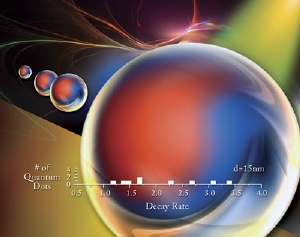Jul 20 2009
Scientists at Argonne National Laboratory's CNM Nanophotonics Group have measured how light emission from individual colloidal semiconductor nanocrystals, or quantum dots, is modified when in proximity to smooth metal films.

Metal nanostructures can strongly modify how quantum dots emit light because of their coupling to electron oscillations in the metal, known as surface plasmons. Emission modification is important for the improvement of light-emitting devices, development of novel imaging techniques, and observation of novel phenomena, such as nanoscale lasing.
Quantum dots and metal nanoparticles can exhibit significant variation in size and shape, however, which makes it difficult to extract quantitative information. The new study alleviates this problem by employing single quantum dots near a smooth gold film. Even using single dots, measurements are difficult because of the well-known phenomenon of fluorescence fluctuation, or blinking.
The CNM scientists developed a time-resolved single-photon counting technique to extract intrinsic emission rates, thereby resolving for the first time coupling between individual quantum dots and the metal surface.